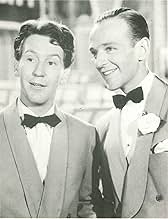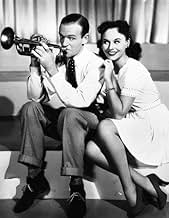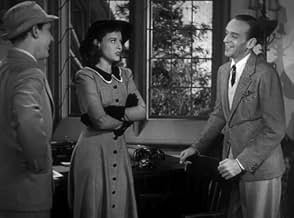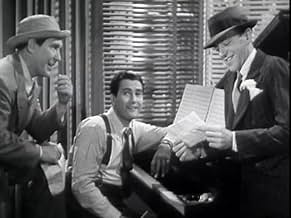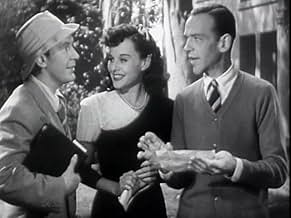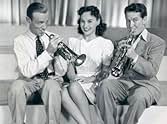AVALIAÇÃO DA IMDb
5,7/10
1,9 mil
SUA AVALIAÇÃO
Adicionar um enredo no seu idiomaAfter perennial college students Danny O'Neill and Hank Taylor are forced to make it on their own, the competitive pair get jobs with Artie Shaw's band and reunite with ex-manager Ellen Mill... Ler tudoAfter perennial college students Danny O'Neill and Hank Taylor are forced to make it on their own, the competitive pair get jobs with Artie Shaw's band and reunite with ex-manager Ellen Miller.After perennial college students Danny O'Neill and Hank Taylor are forced to make it on their own, the competitive pair get jobs with Artie Shaw's band and reunite with ex-manager Ellen Miller.
- Direção
- Roteiristas
- Artistas
- Indicado a 2 Oscars
- 2 indicações no total
Jimmy Conlin
- Mr. Dunn
- (as Jimmy Conlon)
Artie Shaw and His Orchestra
- Artie Shaw and His Band
- (as Artie Shaw and His Band)
Phil Arnold
- Shaw's First Manager
- (não creditado)
Bobby Barber
- Room Service Waiter
- (não creditado)
Bus Bassey
- Tenor Sax Player
- (não creditado)
William 'Billy' Benedict
- Ticket Taker
- (não creditado)
Vernon Brown
- Trombone Player
- (não creditado)
Billy Butterfield
- Trumpet Player
- (não creditado)
Avaliações em destaque
This is an OK Fred Astaire movie. A couple of good dance sequences - one with Paulette Goddard, who is not impressive on the floor, and one where he's tap-dancing while conducting Artie Shaw's orchestra. The plot is dismal, Burgess Meredith as comic relief is faintly amusing at best, though in his defense the script gave him very little to work with.
Fans of swing will want to see "Second Chorus", though, for the musical sequences. In particular, a five-minute fantasia that Shaw and the band (plus a string section) play. This piece has been scored and has been recorded several times under the title of Artie Shaw's Clarinet Concerto; but no other clarinetist, popular or classical, has brought the same excitement to the piece that Shaw did. It's worth renting for that sequence alone.
It's a real shame that the director couldn't work out a sequence in which Astaire dances to Shaw's clarinet - playing, say, "Begin the Beguine", or "Frenesi", or "Traffic Jam", or any other his many other hits. A real shame indeed.
Fans of swing will want to see "Second Chorus", though, for the musical sequences. In particular, a five-minute fantasia that Shaw and the band (plus a string section) play. This piece has been scored and has been recorded several times under the title of Artie Shaw's Clarinet Concerto; but no other clarinetist, popular or classical, has brought the same excitement to the piece that Shaw did. It's worth renting for that sequence alone.
It's a real shame that the director couldn't work out a sequence in which Astaire dances to Shaw's clarinet - playing, say, "Begin the Beguine", or "Frenesi", or "Traffic Jam", or any other his many other hits. A real shame indeed.
Second Chorus has two good scenes; the one where Fred and Paulette take the floor for some good old fashioned dancing at the end of the I'll Dig It number; and the one where Fred conducts the band and taps at the same time.
Plotwise it is wafer-thin. Astaire and Burgess Meredith play rather over-aged students (Fred Astaire a 'young man'??) who play in a band called the Perennials, a college band who start to take all the bookings from more established outfits like Artie Shaw's, thanks to their enterprising manager Goddard. Naturally both are competitive and want both to be in Shaw's band and get off with Goddard.
Yawn. Artie Shaw and his band appear and play great music, although he was no actor - you'd think all those dumb movie star brides would have taught him some tricks of the trade ... Goddard doesn't look the part and her role doesn't seem right for her. Charles Butterworth also appears as a lousy mandolin player who finances a big concert for the band.
Fairly enjoyable despite the shortcomings but no great shakes when up against Fred's best work with Ginger.
Plotwise it is wafer-thin. Astaire and Burgess Meredith play rather over-aged students (Fred Astaire a 'young man'??) who play in a band called the Perennials, a college band who start to take all the bookings from more established outfits like Artie Shaw's, thanks to their enterprising manager Goddard. Naturally both are competitive and want both to be in Shaw's band and get off with Goddard.
Yawn. Artie Shaw and his band appear and play great music, although he was no actor - you'd think all those dumb movie star brides would have taught him some tricks of the trade ... Goddard doesn't look the part and her role doesn't seem right for her. Charles Butterworth also appears as a lousy mandolin player who finances a big concert for the band.
Fairly enjoyable despite the shortcomings but no great shakes when up against Fred's best work with Ginger.
After Fred Astaire finished his RKO contract in 1939 with The Story of Vernon and Irene Castle, he freelanced for the rest of his career. His first film under the Paramount banner was Second Chorus which had him co-starring with marrieds to be Paulette Goddard and Burgess Meredith and big bandleader Artie Shaw. There seems to be a consensus among the reviewers that this was Astaire's worst musical film and I'm not going to dispute that.
Of course second rate Fred Astaire is better than most and he does have some nice dance numbers, but even they're not up to his usual creative genius. I think Astaire realized he was in a turkey and walked through it to collect his paycheck and move on to something better.
Poor Paulette Goddard however. She was just beginning her career and she had gotten good notices for Modern Times and The Women. She had been in stage choruses before so it wasn't like she didn't have any musical training. The following year she was in another musical disaster, the independent United Artist film Pot O' Gold with Jimmy Stewart. That was with another bandleader, Horace Heidt. Something about Paulette and bandleaders. Anyway she got a long term Paramount contract for the Forties and much better parts including three DeMille films.
As an actor, Artie Shaw was a great clarinetist and bandleader. Of course he joins other great contemporary thespians like Glenn Miller, Tommy Dorsey, and Benny Goodman all who made Hollywood films at the time. His band has a few great numbers though I would have liked to have seen Shaw reprise his all time classic instrumental hit, Begin the Beguine.
The film starts off kind of dumb to begin with. We're asked to believe that the 41 year old Fred Astaire and his pal Burgess Meredith are a pair of perennial college students who keep flunking courses to stay in college so they can advertise their band as a college orchestra. Even Jack Oakie didn't stay in college forever.
After horror of horrors Meredith graduates they have to start looking for work and they keep trying to get a break with Artie Shaw. Of course it all works out in the end, but for those interested in seeing the film, I shan't say how.
Charles Butterworth is on hand to play another of his droll eccentrics and he gets a few laughs. But unless you like Fred Astaire and/or Artie Shaw you might well skip Second Chorus.
Of course second rate Fred Astaire is better than most and he does have some nice dance numbers, but even they're not up to his usual creative genius. I think Astaire realized he was in a turkey and walked through it to collect his paycheck and move on to something better.
Poor Paulette Goddard however. She was just beginning her career and she had gotten good notices for Modern Times and The Women. She had been in stage choruses before so it wasn't like she didn't have any musical training. The following year she was in another musical disaster, the independent United Artist film Pot O' Gold with Jimmy Stewart. That was with another bandleader, Horace Heidt. Something about Paulette and bandleaders. Anyway she got a long term Paramount contract for the Forties and much better parts including three DeMille films.
As an actor, Artie Shaw was a great clarinetist and bandleader. Of course he joins other great contemporary thespians like Glenn Miller, Tommy Dorsey, and Benny Goodman all who made Hollywood films at the time. His band has a few great numbers though I would have liked to have seen Shaw reprise his all time classic instrumental hit, Begin the Beguine.
The film starts off kind of dumb to begin with. We're asked to believe that the 41 year old Fred Astaire and his pal Burgess Meredith are a pair of perennial college students who keep flunking courses to stay in college so they can advertise their band as a college orchestra. Even Jack Oakie didn't stay in college forever.
After horror of horrors Meredith graduates they have to start looking for work and they keep trying to get a break with Artie Shaw. Of course it all works out in the end, but for those interested in seeing the film, I shan't say how.
Charles Butterworth is on hand to play another of his droll eccentrics and he gets a few laughs. But unless you like Fred Astaire and/or Artie Shaw you might well skip Second Chorus.
... with the first act being his dance partnership with his sister and his second act being his RKO years.
"Second Chorus" is not a widely known film, but it will probably be enjoyable to any fan of Fred Astaire. If you're not particularly fond of Astaire, you might want to pass on this one since seeing Astaire in action in an unusual role is the main attraction. The story is that Danny O'Neill (Fred Astaire) and Hank Taylor (Burgess Meredith) are leaders of a band. The two have been intentionally failing in college, because they like the atmosphere, and also because as long as they are officially students they can spend their time running the band and making a pretty good living at it. When Ellen Miller (Paulette Goddard) enters the picture, they both get greedy and want her attention for themselves. Thus they each double-cross the other and both wind up getting expelled from the university, thus ending their cozy arrangement with their band. They spend most of the rest of the film continuing to double-cross one another, this time over trying to get into Artie Shaw's band as well as trying to win over the affections of Ellen, who now works for Shaw.
The things that are not so great about this film are the less than great comic timing, and the tiresome scenes with J. Lester Chisholm, played by Charles Butterworth. Mr. Butterworth is no Edward Everett Horton, and as a less-than-adequate character actor you just want to shoo the guy off stage every time he turns up. Also, if you're watching this film to see lots of Astaire's wonderful dancing, you'll likely be somewhat disappointed. He does do some singing and dancing, but this film mainly shows off his comic abilities, of which the mischievous Astaire has plenty. This part would have been better if the comic timing of the script had been tighter, though.
"Second Chorus" is not a widely known film, but it will probably be enjoyable to any fan of Fred Astaire. If you're not particularly fond of Astaire, you might want to pass on this one since seeing Astaire in action in an unusual role is the main attraction. The story is that Danny O'Neill (Fred Astaire) and Hank Taylor (Burgess Meredith) are leaders of a band. The two have been intentionally failing in college, because they like the atmosphere, and also because as long as they are officially students they can spend their time running the band and making a pretty good living at it. When Ellen Miller (Paulette Goddard) enters the picture, they both get greedy and want her attention for themselves. Thus they each double-cross the other and both wind up getting expelled from the university, thus ending their cozy arrangement with their band. They spend most of the rest of the film continuing to double-cross one another, this time over trying to get into Artie Shaw's band as well as trying to win over the affections of Ellen, who now works for Shaw.
The things that are not so great about this film are the less than great comic timing, and the tiresome scenes with J. Lester Chisholm, played by Charles Butterworth. Mr. Butterworth is no Edward Everett Horton, and as a less-than-adequate character actor you just want to shoo the guy off stage every time he turns up. Also, if you're watching this film to see lots of Astaire's wonderful dancing, you'll likely be somewhat disappointed. He does do some singing and dancing, but this film mainly shows off his comic abilities, of which the mischievous Astaire has plenty. This part would have been better if the comic timing of the script had been tighter, though.
There are not many strong points to "Second Chorus", and it is really only watchable because of Fred Astaire, whose talent and charisma provide for some good moments. The writing is noticeably weak, and the rest of the production is not strong enough to overcome the faulty story-line and the mediocre dialogue. The whole premise of the college band does not work for a moment, and there is never a time when the viewer is not overly conscious that the whole situation is contrived.
To be sure, some of Astaire's most enjoyable pictures have lightweight plots, which allow him and the rest of the cast to be the center of attention. But the good ones are much more creative than this, and they also come with much better characters and dialogue. As slight as the story lines may be in "Top Hat" or "Swing Time", you don't think about it while you are watching them, because everything else is of such high quality. "Second Chorus", on the other hand, seems thrown together, as if they just hoped that Astaire could keep it afloat by himself.
That's not to criticize the rest of the cast, who do their best. Paulette Goddard can be very charming, but her character here gives her very little to work with. She does manage to get a couple of nice moments out of it, anyway. Burgess Meredith is stuck with a character who is both ill-defined and annoying, so he never has any chance to show what he could do.
It's worth watching once, as is practically anything that stars Astaire. There is at least one very good number, and most of the time it is watchable, as long as your expectations are not too high.
To be sure, some of Astaire's most enjoyable pictures have lightweight plots, which allow him and the rest of the cast to be the center of attention. But the good ones are much more creative than this, and they also come with much better characters and dialogue. As slight as the story lines may be in "Top Hat" or "Swing Time", you don't think about it while you are watching them, because everything else is of such high quality. "Second Chorus", on the other hand, seems thrown together, as if they just hoped that Astaire could keep it afloat by himself.
That's not to criticize the rest of the cast, who do their best. Paulette Goddard can be very charming, but her character here gives her very little to work with. She does manage to get a couple of nice moments out of it, anyway. Burgess Meredith is stuck with a character who is both ill-defined and annoying, so he never has any chance to show what he could do.
It's worth watching once, as is practically anything that stars Astaire. There is at least one very good number, and most of the time it is watchable, as long as your expectations are not too high.
Você sabia?
- CuriosidadesWhile Fred Astaire was making this film, Ginger Rogers was starring in Kitty Foyle (1940). This went on to win her the Academy Award for Best Actress. After she won, Astaire sent her a telegram simply reading "Ouch".
- Erros de gravação(at around 3 mins) Danny's chair suddenly jumps to immediately (and intimately) next to Ellen's left side at the table.
- Citações
Lester Chisholm: [in a fake Russian accent] Vas good.
Danny O'Neill: Vas good? Vas per-fect.
- Cenas durante ou pós-créditosOpening credits prologue: A UNIVERSITY IN NEW ENGLAND
- Versões alternativasThis film was published in Italy in an DVD anthology entitled "Royal Wedding", distributed by DNA Srl. The film has been re-edited with the contribution of the film history scholar Riccardo Cusin . This version is also available in streaming on some platforms.
- ConexõesEdited into Your Afternoon Movie: Second Chorus (2022)
- Trilhas sonorasWould You Like to Be the Love of My Life
Music by Artie Shaw
Lyrics Johnny Mercer
Played by Artie Shaw and His Orchestra (uncredited)
Sung by Fred Astaire (uncredited)
Principais escolhas
Faça login para avaliar e ver a lista de recomendações personalizadas
- How long is Second Chorus?Fornecido pela Alexa
Detalhes
- Data de lançamento
- País de origem
- Idioma
- Também conhecido como
- Amor de mi vida
- Locações de filme
- Empresa de produção
- Consulte mais créditos da empresa na IMDbPro
- Tempo de duração1 hora 24 minutos
- Cor
- Proporção
- 1.37 : 1
Contribua para esta página
Sugerir uma alteração ou adicionar conteúdo ausente

Principal brecha
By what name was Amor da Minha Vida (1940) officially released in India in English?
Responda

